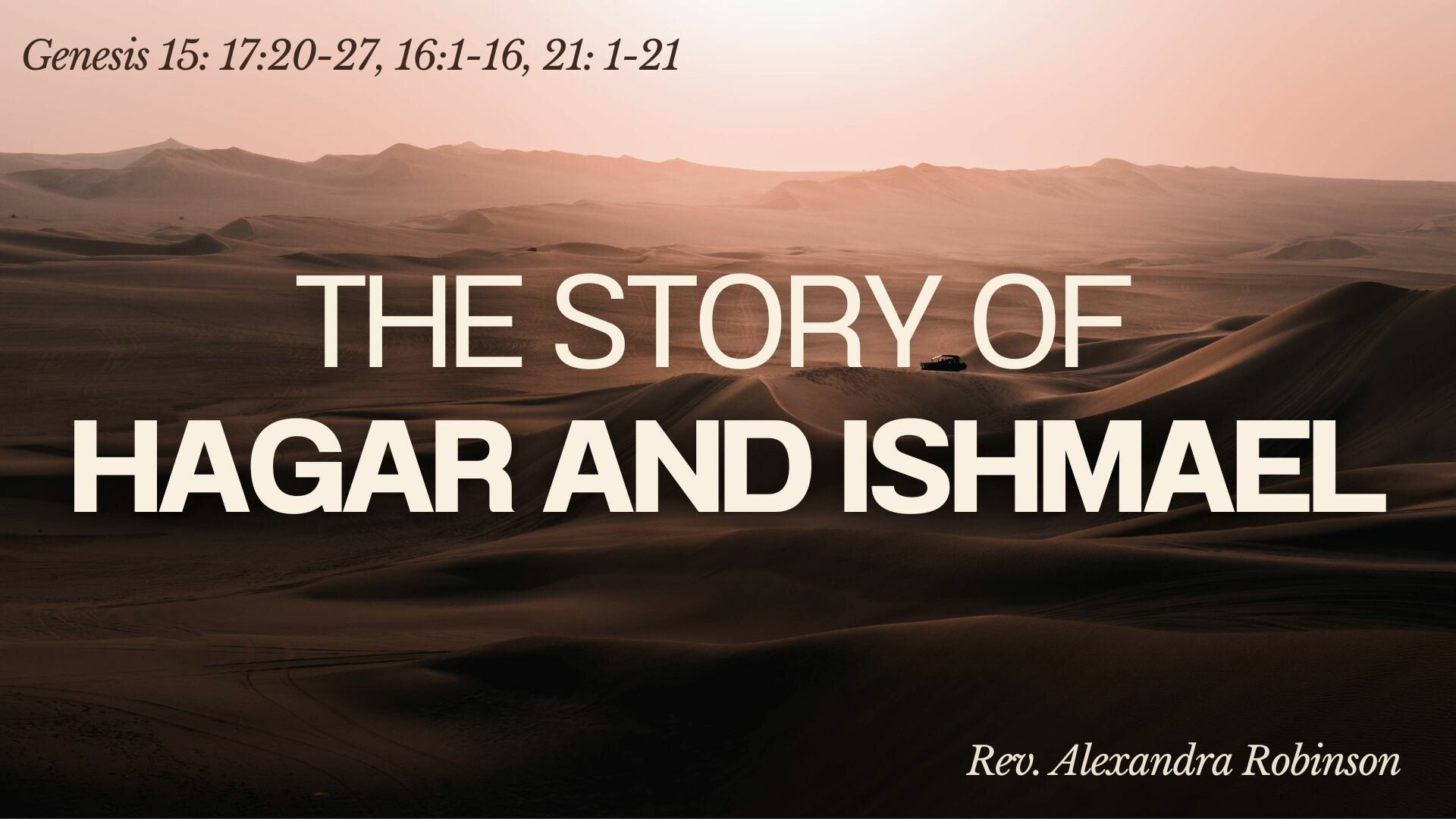The Story of Hagar and Ishmael
by Rev. Alexandra Robinson on September 10, 2025

The story of Hagar and Ishmael is not just a story – it is a snapshot into our human condition – of fear, abandonment, jealousy and power. And it is a story that continues today – all based on what we believe to be God’s promises.
Many of us know the story of Abraham and Sarah – the ancestors of the Jewish faith.
But many may not know the story of Hagar and Ishmael – the ancestors of the Muslim faith.
Hagar is a slave woman, who was acquired during Abram’s time in Egypt. When Abram and Sarai went to Egypt due to a famine, Abram told Pharoah that Sarai was his sister, even though she was his wife! Abram said this because Sarai was so beautiful Abram assumed he would be killed. So Pharoah takes Sarai into his household as a concubine, and gives Abram a lot of wealth as a reward. Then Pharoah and his household are afflicted by plagues which Pharoah realizes is a result of Abram’s lie. In confronting Abram about this, Pharoah let’s Abram keep all the possessions and more, including the slave girl – Hagar. (There is too much for me to unpack here regarding patriarchy and power, not to mention foreshadowing of the Exodus, but you get the point, so moving on….)
When Abram is told by God he will have an heir by his seed (Genesis 15), Sarai makes a very logical assumption this will not be through her own womb as she is well beyond child-bearing age. Abram tells Sarai to use her power so she “takes” Hagar, (please recognize this from Eve “taking” the fruit) to be the surrogate for Abram. When Hagar conceives from Abram’s “seed,” she looks with contempt upon Sarai, who then mistreats her and Hagar runs away. But God hears Hagar’s cries and responds by telling her God will greatly multiply her offspring: they can not even be counted because of their multitude (sound familiar?) God tells Hagar that her firstborn son is to called Ishmael, meaning “God hears.” This is why God tells her to return and submit to her mistress (not as an endorsement of slavery, despite how this has been used in the past to continue cycles of female abuse.)
When Ishmael is about 13 years old, God changes Abram’s name to Abraham and Sarai’s name to Sarah and tells him that Sarah will bear a child, and Abraham’s reply is “O that Ishmael might live in your sight!” (Genesis 17:18). It is obvious that Abraham deeply cares for his son Ishmael and wants blessing upon him as well. Ishmael is then promised nations that will be fruitful and exceedingly numerous, as a father of 12 princes and a great nation. Ishmael is included in the circumcision of all of Abraham’s household as a sign of the covenant. It is only when Sarah gives birth to Issac, that she demands Hagar and Ishmael leave, out of fear and jealousy that they might inherit with Issac. So Abraham gives Hagar and Ishmael water and food and they depart to the desert. God again hears Hagar’s cry in
the wilderness and provides a well for them to drink. Ishmael becomes an expert with the bow, and grows to be strong, and an Egyptian wife is found for him. Their union begins the many nations fulfilling God’s promise. We know those as the Arab nations, and the prophet Muhammed is believed to be descended from Ishmael.
The book of Genesis, written by the Bronze Age patriarchs, did not craft their stories for an audience to sympathize with the plight of those auxiliary to the lineage of God’s special promises. But as we listen carefully to the whole story, we realize that Ishmael is not disinherited from an abundance of blessings. This shows more of an inclusivity than abandonment. It reveals to us that God has room for promises of foremothers and lineages that actually branch away from the Israelites.
Before Islam developed as a religion, Ishmael was depicted in many ways, but after its establishment, Ishmael was almost always seen in a negative light in Jewish and Christian texts, becoming a symbol for “other” in these religions. In the Islamic texts Ishmael and Hagar are actually taken to Mecca by Abraham, and when asked who will care for them, Abraham tells Hagar that God will, to which she professes her faith. Hagar too believes God will guide them. This should give us pause as to how our own faith history has interpreted the story of Hagar and Ishmael.
As we read the book of Genesis in the deep dive we are undergoing, I hope we will pay attention to these details, because it is an understanding of the entirety of the text that can help us see how it has and continues to impact even our current understandings of what is happening in promised land for both Jewish and Muslim peoples. We must recognize the responsibility that our human condition of fear, abandonment, jealousy and power has played in history since the very beginning. As we pray for peace in the continual conflict, let us be mindful of the promises God has made to both nations.